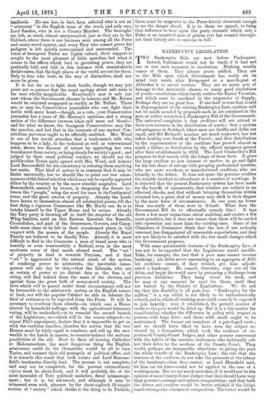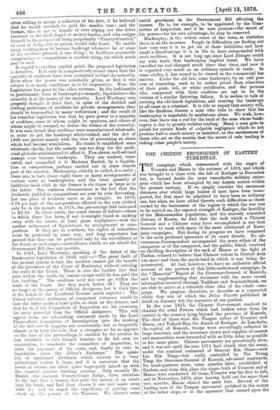BANKRUPTCY LEGISLATION. T WO Bankruptcy Bills are now before Parliament. Indeed,
Parliament would not be itself, if it had not one or two such measures in incubation. Nothing usually comes of them. They always prove addled. They are to the Bills upon which Government has really set its mind very much what Krieg-spiel or a march-past at Aldershot is to actual warfare. They are so many acts of homage to the mercantile classes, so many good resolutions of youth—resolutions which barely outlive the Easter Vacation, and which must be sacrificed to the exigencies of Supply. Perhaps they are no great loss. If one-half is true that is said in disparagement of the existing Bankruptcy Law, matters will not be much mended by proposals such as are contained in the new, or rather resuscitated, Bankruptcy Bill of the Government. The universal complaint is that creditors will not attend to their own interests in the distribution of assets ; that a system advantageous in Scotland, where men are thrifty and debts are small, and Old Richard's maxims are much respected, has not taken healthy root South of the Tweed ; and that distribution by the representative of the creditors has proved almost as much a failure as distribution by the official assignees proved after their establishment in 1832. The Lord Chancellor's Bill proposes to deal merely with the fringe of these facts. It gives the large creditor no new interest or motive to go and fight for his fair share of salvage with grasping professional trustees, who are mere wreckers, or manufactured creditors, who are friendly to the debtor. It does not spare the genuine creditor the trouble incident to attendance at a number of meetings. It is objected that the present Bankruptcy system has been made for the benefit of accountants, that trustees are subject to no effectual checks, and that without bringing themselves within criminal law, a great deal of money may stick to their fingers by the mere force of circumstances. In one year, no fewer than one-sixth of them were in default. What does the Government Bill do to effectually remedy this ? It lays down a few more injunctions about auditing, and creates a few more penalties, but it does not insure that these will be carried into operation any more than the existing ones. Some of the Chambers of Commerce think that the law, if not radically unsound, has disappointed all reasonable expectations, and they are not likely to be satisfied with the few small changes which the Government proposes.
With some questionable features of the Bankruptcy Law, it was not to be expected that the Legislature would meddle. Take, for example, the fact that a poor man cannot become bankrupt ; his debts never amounting to an aggregate of £50, his creditors cannot, if they wished, get him adjudi- cated a bankrupt. He cannot, therefore, wipe out all his debts, and begin the world anew by procuring a discharge from previous liabilities. They hang about his neck, and he may at any moment be sued for them, until they are barred by the Statute of Limitations. We do not say that this disability is all pure loss. "Bankruptcy for the million" is a cry which is not likely to be enthusiastically echoed, and in which all working-men could scarcely be expected to join heartily ; were it established, the present sources of credit to the poor would be dried up. But it is a fair matter for consideration whether the difference in policy with respect to persons with large debts and those with small ought to be maintained. The former are members of a privileged caste ; and we should have liked to have seen the subject re- viewed by a Committee, which took the evidence of ex- perienced County-Court Judges, and other persons conversant with the habits of the usurious tradesmen who habitually col- lect their debts by the medium of the County Court. They would, perhaps, see insuperable objections to giving the poor the whole benefit of the Bankruptcy Law ; the rule that the trustees of the creditors do not take the proceeds of the labour of the bankrupt—that they cannot, as Lord Mansfield said, let him out for hire—could not be applied to the case of a working-man. But we are much mistaken, if it would not be the opinion of most County-Court Judges that they should have very large powers to arrange and enforce compositions; and that both the debtor and creditor would be better satisfied if the Judge could extemporise schemes of composition. The latter would be often willing to accept a reduction of his debt, if he believed that he would certainly be paid the smaller sum ; and the former, who is apt to despair of ever wiping out the debts incurred to the local draper or money-lender, and who resigns himself to the prospect of being perpetually "County-Courted," or even of being sent to prison, would take heart. To enable every working-man to become bankrupt whenever he or some of his creditors pleased, is one thing ; to facilitate reasonable compromises or compositions is another thing, for which much may be said.
In regard to another capital point, the proposed legislation is defective. It is only in comparatively recent times that the majority of creditors have been permitted to bind the minority. Even when the power was nominally given, at first it was subject to so many conditions as to be inoperative. Now, the Legislature has gone to the other extreme. In the fashionable or gentlemanly form of bankruptcy—namely, liquidation—the minority is at the mercy of the majority. Lord Westbury very properly thought it hard that, in spite of the decided and abiding preference of creditors for private arrangements, they should be trammelled by many restrictions ; and the result of his remedial legislation was that he gave power to a majority of creditors, some of whom might be spurious, and others of whom might be secured, to defeat the wishes of the minority. It was soon found that creditors were manufactured wholesale, in order to get the bankrupt whitewashed, and the Act of 1869 was passed mainly with the view of preventing an abuse which had become scandalous. No doubt it established some wholesale checks, but the malady was too deep for the medi- cinal globules administered to affect it. Few clever, well-advised scamps ever become bankrupts. They are washed, reno- vated, and enamelled a la Madame Rachel, by a liquida- tion or composition, perhaps carried out in some remote part of the country. Bankruptcy, strictly so called, is a rarity ; there are, in fact, about eight times as many arrangements of various sorts as bankruptcies, and the total quantity of liabilities dealt with in the former is six times as large as in the latter. One ominous circumstance is the fact that the dividends yielded in compositions are year by year decreasing. Let one piece of evidence serve as an example. In 1870, 4.70 per cent. of the compositions effected in the year yielded only is. in the pound ; in 1876, the per-centage had increased- to 22.48. In other words, the worst classes of failure—those in which there has been, if not downright fraud in making away with the estate, at least gross negligence—seek the modest retirement of liquidations by arrangement or corn- potion. If they are to continue, the rights of minorities must be protected in some way, and long experience has proved that they can be protected only by the surveillance of the Court at each stage,—surveillance which we are afraid the Government Bill does not provide.
In 1861, Lord Westbury, speaking of the defect of the Bankruptcy legislation of 1849, said :—" The great fault of the present system is that the creditor cannot get the benefit of the provisions of the Court of Bankrutcy without entering the walls of the Court. There is also the further fact that once within the walls, he cannot escape until he has paid the last farthing." The creditors need not now go within the walls of the Court. Are they much better off ? They are no longer at the mercy of Official Assignees, but is their fate at the hands of the Unofficial Trustee much superior ? The almost universal testimony of competent witnesses would be that the latter picks a bone quite as clean as the former, and that he is, if the Committee of Inspection are his creatures, far more powerful than the Official Assignees. This will appear from one astonishing statement made by the Lord Chancellor's Committee of Investigation into the working of the Act :—" It happens not occasionally, but so frequently almost as to form the rule, that a stranger, so far as appears on the face of the proceedings, is enabled by the proxies he has obtained, to vote himself trustee, to fix his own re- muneration, to nominate the committee of inspection, to order the payment of his costs, and, finally to vote in liquidation cases the debtor's discharge." The quan- tity of unclaimed dividends which accrues to a busy professional trustee is large, and it is notorious that the assets of estates are often quite improperly mixed up with the trustee's private banking account. Only recently Mr. Daniel, the eminent County-Court Judge, drew attention to the fact that a trustee had paid the money of an estate into his bank, and had then drawn it out and made away with it ; and he urged the expediency of putting some check on the powers of the Trustees. We observe some useful provisions in the Government Bill Affecting the trustee. He is, for example, to be appointed by the Coma- mittee of Inspection, and if he uses proxies—the secret of his power—for his own advantage, he may be removed. Bankruptcy, in the widest sense of the term, as statistics show, is on the increase. People in difficulties are finding out hew very easy it is to get lid of their liabilities, and how small a disadvantage it is in life to have compounded with one's creditors. It is not long ago since Lord Abinger could say with truth that bankruptcy implied fraud. We have travelled far and changed much since that time, and now it is regarded very much as an ordinary episode in trade. In some circles, it has ceased to be viewed as the commercial bar sinister. Under the old law, some bankrupts, by an odd pro- cess of reasoning, used to be rather proud than otherwise of their pink, red, or white certificates, and the persons who compound with their creditors are apt to be the victims of a similar flattering fallacy. It is useless to talk of reviving the old harsh legislation, and treating the bankrupt in all cases as a criminal. It is idle to expect that society will, like the Quakers; disown a man who fails to show that his- bankruptcy is imputable to misfortune alone. We wish, how- ever, that there was a rod for the back of the man whose bank- ruptcy is due to grossly reckless trading Many a man goes to prison for certain kinds of culpable negligence which do not produce half so much misery or mischief, as the carelessness of those who act on the maxim that the secret of safe trading is risking other people's money.



































 Previous page
Previous page